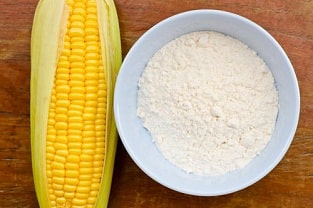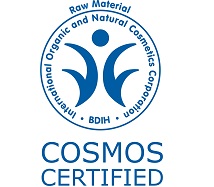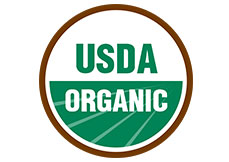

Organic Corn Starch
At Aryan, we take pride in offering premium quality organic bulk corn starch sourced from trusted organic farms around the globe.
Corn starch, also known as corn flour or maize starch, is a fine white powder derived from the endosperm of corn kernels. It is primarily composed of starch, which is a complex carbohydrate made up of long chains of glucose molecules. It was developed in 1844 in New Jersey and is produced today in corn-growing countries like the United States, China, Brazil, and India. It’s found in cuisines throughout the world, with North America and Asia leading both production and use.
The process of extracting corn starch involves milling the corn kernels to separate the various components (such as germ, bran, and endosperm). The endosperm, which contains the starch, is then separated and washed to remove the protein and fibre components. The resulting starch is then dried and milled into a fine powder, resulting in corn starch.
Corn starch is valued for its thickening properties and is commonly used as a thickener in culinary applications. When mixed with a liquid and heated, the starch molecules absorb the liquid and swell, creating a gel-like consistency that thickens sauces, gravies, soups, and desserts. It is often preferred over other thickeners like flour or arrowroot powder because it produces a clearer, more transparent texture and is neutral in flavour.
In addition to its thickening properties, corn starch has other applications as well. It is used as a binder in food products, a dusting agent for baked goods, and a primary ingredient in certain baking powders. It is also used in non-food products such as adhesives, paper products, and cosmetics.
Overall, corn starch is a versatile ingredient with a wide range of uses in both culinary and non-culinary applications, prized for its ability to thicken, bind, and stabilize various products.
Features of Organic Corn Starch
1. Certified Organic: Organic corn starch is produced from non-genetically modified (non-GMO) corn that is grown without the use of synthetic pesticides, herbicides, or fertilizers. It is certified by accredited organizations to meet stringent organic standards, ensuring a product that is free from harmful chemicals and environmentally sustainable.
2. Non-GMO: Organic corn starch is derived from non-GMO corn varieties, providing assurance to consumers who seek products free from genetically modified organisms.
3. Gluten-Free: Organic corn starch is naturally gluten-free, making it suitable for individuals with celiac disease or gluten sensitivities. It serves as a safe thickening and binding agent in gluten-free recipes and products.
4. Neutral Flavour and Colour: Organic corn starch has a neutral taste and colour, allowing it to blend seamlessly into various recipes without altering the flavour or appearance of the final product.
5. Thickening Power: Like conventional corn starch, organic corn starch is prized for its excellent thickening properties. When mixed with liquid and heated, it forms a smooth gel-like consistency, ideal for thickening sauces, soups, gravies, and desserts.
6. Versatility: Organic corn starch is a versatile ingredient used in a wide range of culinary applications, including baking, cooking, and food processing. It can also be used in non-food products such as cosmetics, pharmaceuticals, and industrial applications.
7. Environmental Sustainability: Organic farming practices promote soil health, biodiversity, and conservation of natural resources. By choosing organic corn starch, consumers support sustainable agricultural practices that minimize environmental impact and promote long-term ecological balance.
8. Quality Assurance: Organic corn starch undergoes rigorous quality control measures to ensure purity, consistency, and compliance with organic standards. It is produced and processed according to strict guidelines to maintain its organic integrity.
Benefits of Organic Corn Starch
1. Gluten-Free Alternative: Organic corn starch is naturally gluten-free, making it a safe alternative for individuals with celiac disease or gluten sensitivities. Using organic corn starch in gluten-free recipes allows those with gluten intolerances to enjoy a wider variety of foods without risking adverse health effects.
2. Low in Calories: Corn starch is relatively low in calories, with about 30 calories per tablespoon. Using it as a thickening agent in recipes allows for the creation of flavourful dishes with fewer calories than those thickened with higher-fat ingredients.
3. Digestive Health: While corn starch itself doesn’t provide fibre, it can be part of a diet that includes fibre-rich foods. Organic corn starch can be used in recipes for individuals with digestive issues, as it’s generally well-tolerated and easy to digest.
4. Blood Sugar Management: Organic corn starch has a high glycaemic index, meaning it can cause a rapid increase in blood sugar levels when consumed in large quantities. However, when used in moderation as part of a balanced meal, its impact on blood sugar may be mitigated.
5. Potential for Allergen-Free Cooking: For individuals with allergies to wheat or other grains, organic corn starch can be a useful ingredient in cooking and baking. It allows for the creation of allergen-free recipes that are safe for consumption by those with food allergies or sensitivities.
6. Alternative Thickening Agent: Organic corn starch can serve as a plant-based alternative to animal-derived thickeners like gelatine or eggs. This makes it suitable for use in vegetarian or vegan recipes and helps reduce reliance on animal products in cooking and baking.
7. Natural Ingredient: Organic corn starch is a minimally processed ingredient derived from corn, making it a natural and wholesome choice for cooking and baking. Choosing organic varieties ensures that the corn used to produce the starch is grown without synthetic pesticides, herbicides, or genetically modified organisms (GMOs).
Usage of Organic Corn Starch
Organic corn starch, is a versatile ingredient that finds applications in various industries. Here are some of the industries where organic corn starch is commonly used:
1. Food Industry:
- Bakery and Confectionery: Organic corn starch is used as a thickening agent in fillings, custards, and fruit sauces. It also enhances the texture of baked goods such as cakes, cookies, and pies.
- Processed Foods: Organic corn starch serves as a stabilizer and thickener in organic processed foods such as soups, sauces, gravies, and desserts.
- Snack Foods: Organic corn starch is used in the production of organic snack foods like organic chips, crackers, and popcorn to improve texture and crispness.
- Gluten-Free Products: Organic corn starch is a key ingredient in organic gluten-free products, providing structure and texture to baked goods without the use of wheat flour.
2. Pharmaceuticals:
- Tablet and Capsule Production: Organic corn starch is used as a filler and binder in the manufacturing of organic tablets and capsules in the pharmaceutical industry.
- Powdered Medications: Organic corn starch serves as a bulking agent and flow enhancer in organic powdered medications.
3. Textiles:
- Textile Sizing: Organic corn starch is used as a sizing agent in organic textile manufacturing to add stiffness and smoothness to fabrics.
- Textile Printing: Organic corn starch is used as a thickener in organic textile printing pastes to control viscosity and improve print quality.
4. Paper and Packaging:
- Paper Coating: Organic corn starch is used in the production of coated organic paper to improve surface properties such as smoothness and ink receptivity.
- Paper Adhesives: Organic corn starch serves as a binding agent in organic paper adhesives and glues.
5. Cosmetics and Personal Care:
- Skincare Products: Organic corn starch is used in organic skincare products such as powders, creams, and lotions for its absorbent properties and silky texture.
- Dry Shampoos: Organic corn starch is used in organic dry shampoos to absorb excess oil and refresh the hair between washes.
6. Industrial Applications:
- Adhesives: Organic corn starch is used as a binder in the production of organic adhesives for paperboard, corrugated cardboard, and other organic paper products.
- Bioplastics: Organic corn starch serves as a raw material in the production of organic biodegradable plastics and packaging materials.
7. Animal Feed: Organic corn starch may be used as a source of energy in organic animal feed formulations for livestock and poultry.
Precautions while using Organic Corn Starch
1. Storage: Store organic corn starch in a cool, dry place away from moisture, heat, and direct sunlight to prevent clumping and degradation of quality over time.
2. Hygiene: Maintain good hygiene practices when handling organic corn starch. Use clean utensils and containers to scoop and transfer the starch to prevent contamination.
3. Allergen Awareness: Be mindful of potential allergens that may be present in the facility where the organic corn starch is processed and packaged. Label containers clearly to indicate any allergen risks, such as cross-contamination with gluten or other allergens.
4. Quality Assurance: Source organic corn starch from reputable suppliers that follow strict quality control measures. Look for certifications such as USDA Organic to ensure the product’s authenticity and purity.
5. Usage Recommendations: Follow recommended usage guidelines for organic corn starch in recipes and formulations. Avoid overuse and adhere to recommended serving sizes to prevent potential digestive issues.
6. Mixing Instructions: When using organic corn starch as a thickening agent, mix it with a small amount of cold liquid to form a slurry before adding it to hot liquids. This helps prevent clumping and ensures even distribution.
Search Products
- Organic Botanical Extract
- Organic Cereals
- Organic Edible Oils
- Organic Emulsifiers
- Organic Essentials Oils & Extracts
- Organic Fatty Acids
- Organic Flours
- Organic Formulations
- Organic Herbs
- Organic Minerals
- Organic Nutraceuticals
- Organic Nuts
- Organic Oil Seeds
- Organic Pulses
- Organic Special Products
- Organic Spices
- Organic Starch
- Organic Vitamins










